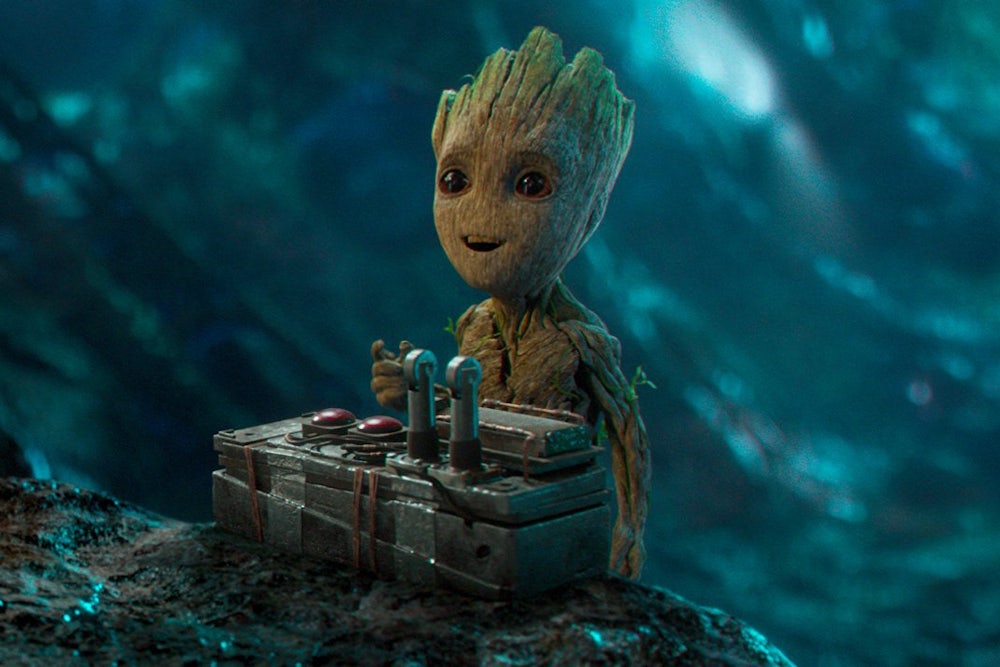It was a moderate disappointment to learn that the upcoming Avengers: Infinity War—in which every Marvel character from every Marvel movie is expected show up in a film I presume will be 634 minutes long—will include the Guardians of the Galaxy. It makes sense, of course: Chris Pratt’s Peter Quill and the gang have become as popular as Spider-Man and Captain America. But the joy of the Guardians of the Galaxy movies, including the sequel Guardians of the Galaxy Vol. 2, is that they seem to exist nearly outside the Marvel cinematic universe.
Sure, there are the nods to continuity, the Thanos references, the Infinity Stones, the Stan Lee cameo. But the bloat that has weighted down other Marvel movies is absent from the Guardians of the Galaxy movies. These movies are self-contained little baubles about a group of misfit weirdos who work together and love each other because all they have is each other. The Guardians of the Galaxy movies are allowed to simply be movies rather than bridges to other, future Marvel franchises. It frees them up to be fun.
And I’ll say: Guardians of the Galaxy Vol. 2 is extremely fun. Taking place shortly after the events of the first film, we don’t have to waste time being introduced to all the characters, from Quill to Zoe Saldana’s Gamora to Dave Bautista’s Dax the Destroyer to that machine gun-firing Rocket Raccoon. This time we do get Baby Groot, who is going to, I suspect, instantly dominate every toy store through Christmas. (I think I want a dancing Baby Groot for my car’s dashboard.) We have an opening credit sequence where the gang fights a monster while Baby Groot dances around—and then we are off.
The dramatic thrust this time is that Quill, as teased in the first film, meets his father, Ego (Kurt Russell), an actual god who wants to re-connect with Quill and take him away from the grotesque Yondu (Michael Rooker), who raised him. Meanwhile, they’re on the run from a race of snobby people known as the Sovereign, and they have to find some way to save the galaxy to boot. Typical Guardians stuff.
The first movie was irreverent—it’s still insane that a major hero in a massive summer movie hit was a vulgar talking raccoon—but this one is more overtly comedic. Essentially, all five of the Guardians are their own comic relief. But what’s surprising about the sequel is how much emotional resonance it has. For all the jokes, and there are many, many jokes, this one is given additional weight by Quill’s need for a parental figure, whether it’s Ego, the god who abandoned him, or Yondu, the savage who took him in.
For all its active silliness, the movie holds on to that familial through line in a way that’s appealing and, ultimately, oddly moving. Quill needs a dad, Gamora needs a sister, Raccoon needs everybody, and, somehow, it really does get to you in the end. A lot of the emotional subplots in the Marvel movies can feel clinical, like Screenwriting 101: Iron Man feels this, then he feels this, then we learn it was this all along. This basic character structure can still be effective—and it’s certainly preferable to the thudding dipshittery of the DC movies—but it can feel perfunctory. So it’s a surprise to see how well the family aspect works in the Guardians sequel. These strange misfits really are searching for something, and I’ll be damned if it didn’t get to me.
Much of this is thanks to Pratt, who manages, almost effortlessly, to give Quill a sweethearted, lunkheaded, deeply appealing charm. It’s a reminder that before the dumb Jurassic World and Passengers—i.e. his increasingly stumbling attempts to be a Traditional Leading Man—he was Andy Dwyer: a golden retriever of a human being. It’s impossible not to cheer for him, and he can still sell a one-liner as well as he sold one of the best sitcom one-liners of all time (reportedly ad-libbed).
The movie is less concerned with action than your typical comic book movie. There are your usual setpieces and space shootouts, but the massive success of the first film has given writer-director James Gunn the freedom to get wordy: Much of the film is simply characters sitting down and talking to each other, except they’re in outer space. Gunn keeps the comedic patter going, though, and the result is a film in which the fight scenes almost seem to get in the way. I wanted these odd ducks just to keep talking and talking and talking.
The movie culminates in a scene that is both cheekily referential to a major moment of cinematic pop culture and also emotionally powerful in its own right, which is pretty much the combination that makes Guardians of the Galaxy Vol. 2 a success. This is a jittery, self-consciously silly comic book movie that invests in the family structure of its heroes, all of whom (except for maybe Gamora) would absolutely love to watch a jittery, self-consciously silly comic book movie. It’s a massive blockbuster that makes you forget it is one. I’m still not sure I need Quill and Baby Groot to be running around with Spider-Man and the Hulk, but as long as they keep coming back to this universe, I’ll be delighted to go back there with them.
Grade: B+
Grierson & Leitch write about the movies regularly for the New Republic and host a podcast on film. Follow them on Twitter @griersonleitch or visit their site griersonleitch.com.
